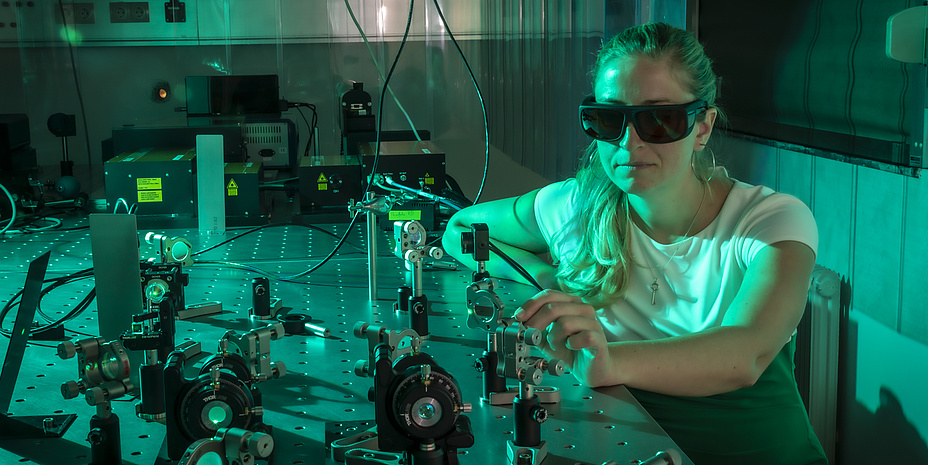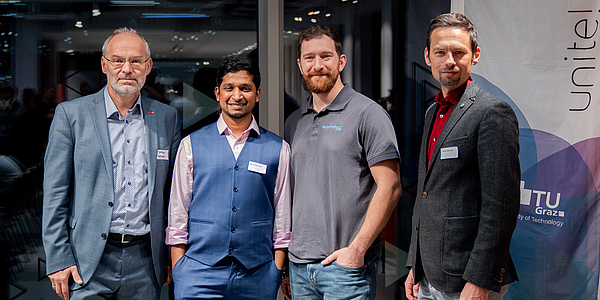Starting Signal for the NAWI Graz Center of Physics

With the funding commitment and planning approval that have just been given, one of the largest inter-university construction projects in Styria is gaining momentum. The physical merger of the physics departments of Graz University of Technology (TU Graz) and the University of Graz will create a prominent physics location in Austria with international visibility. The Graz Center of Physics will be built on the campus of the University of Graz. The spatial consolidation of the physics departments of the two universities will strengthen the long-standing cooperation in the NAWI Graz network, further expand synergies in research, teaching and infrastructure, and achieve a distinctive sharpening of the profile of physics far beyond the location.
TU Graz Rector Harald Kainz is delighted about the prospect: "With the Graz Center of Physics, the long-standing successful research and teaching cooperation of around 600 physicists and around 1,500 students from TU Graz and the University of Graz in the field of physics will gain a shared physical home. The focus on nanotechnologies and computational physics will give the GCP a distinctive profile with international appeal. Whether in the development of novel nanomaterials, space sciences, or climate physics, the GCP will conduct research on topics of the highest societal relevance."
Martin Polaschek, Rector of the University of Graz, is also enthusiastic: "The University of Graz is extremely pleased that funding has now been secured for this lighthouse project. The fact that two universities are combining a research area in this form in a joint building is a unique project on the Austrian research landscape and will mean a strong boost for research in Styria."
Research focuses of the GCP
The central joint research focus of the Graz Center of Physics will be in the field of nano and quantum materials. The Graz location already enjoys a unique position on the Austrian research landscape and beyond in this field of research on nanoscale and quantum-physics dominated materials. The Center for Electron Microscopy is an instrumental beacon in this regard. The central focus on nano and quantum materials is supported by three other areas of competence of international importance: teaching methodology, elementary particle physics and the astrophysics complex, and climate physics and space sciences. By merging and strengthening these areas in the Graz Center of Physics, the field of physics will be covered in its entire breadth in research and teaching, and strong synergies can be expected. The range of topics dealt with at the Graz Center of Physics will play an increasingly important role in challenges relating to energy, digitalization, sustainability, the environment and health.
NAWI Graz: a model of success in natural science research and teaching
Since 2004, TU Graz and the University of Graz have been pooling resources and know-how in natural science research and teaching in the NAWI Graz network, a showcase project that is unique in Austria. The establishment of the Graz Center of Physics is expected to significantly increase the visibility of physics among potential students as well as among teachers and in international appointment procedures. As regards study programmes, the bachelor's programme and the two English-language master's programmes in physics and technical physics are offered jointly under the umbrella of NAWI Graz, as are teacher training and doctoral studies. Students of all study programmes will benefit from the Graz Center of Physics in terms of the short distances at the shared location, state-of-the-art classrooms and lecture halls, and state-of-the-art laboratory and equipment infrastructure in one location.
Schedule and costs
The federal property company BIG, as the contract-awarding authority, has just announced the architectural competition for the NAWI Graz Center of Physics. The new building with a gross floor area of 50,000 square meters is being constructed on the site of the multilevel pre-clinical building in Harrachgasse on the campus of the University of Graz. Construction is expected to start in 2024, once the remaining institutes of the Medical University of Graz have been relocated to the new MED Campus Graz and the existing building has been demolished. The total investment costs amount to 354 million euros – of which 313 million euros are for construction and an additional 41 million euros for equipment. The costs will be borne by the federal government and TU Graz and the University of Graz will rent the premises from BIG.
Kontakt
Barbara GIGLER
TU Graz | Press officer
Communications and Marketing
Rechbauerstraße 12, 8010 Graz
Mobile: +43 664 608736006
email: barbara.gigler@tugraz.at




